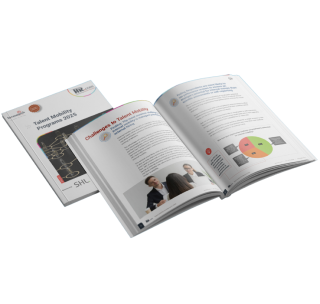State of Talent Mobility AMS 2025
Access the full report here.
Talent Mobility
What is it?
Talent mobility refers to the movement of employees within an organization—whether through internal hiring, lateral moves, promotions, project-based work, reskilling for new roles, or redeployment.
Why is it important?
A strong talent mobility strategy enables businesses to adapt to change, optimize workforce potential, and retain top talent by providing clear career pathways and growth opportunities.
"Without reliable skills data, talent mobility remains an aspiration rather than a reality. Organizations need to move beyond outdated performance reviews and embrace a data-driven approach to truly unlock internal talent potential."
— Josh Bersin, Global HR Industry Analyst
Insights from our research:
-
64% of talent professionals say talent mobility has a significant positive impact on business outcomes and retention.
-
Over 50% of respondents find it somewhat or very challenging to translate and measure skills using their current skills framework.
-
87% said that data is important or critical in making mobility decisions.
-
Only 37% of those surveyed are investing in upskilling and reskilling programs to bridge critical skills gaps and address talent shortages.
-
33% said leaders prioritize recruiting externally rather than nurturing existing employees.
Access all the Insights
Explore the key challenges and emerging trends shaping talent mobility for HR and talent leaders.
Download Now

Preview
What's Inside the Report
Download the Full Report
State of Talent Mobility AMS 2025
Access the full report to uncover the 6 key trends and challenges HR and talent leaders need to know about talent mobility.
Download Now

